by Natalie Hanson
posted April 29
The Chico Police Department, after facing years of scrutiny over transparency and accountability concerns, has launched an effort to improve its community image.
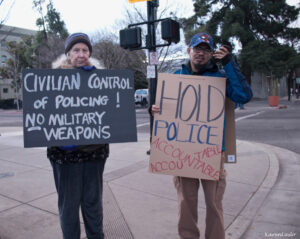
Chico PD’s administration has within the last six months jump-started several efforts to improve its public image, announcing today the results of its Community Survey, which can be found here.
Chief Billy Aldridge, who assumed leadership in December 2022, has re-organized the department’s Police Community Advisory Board (PCAB) that the City says is “working to enhance communication and transparency.” The board’s formation follows years of pressure from community members who want improvement in the public’s ability to air concerns and grievances.
The board and Aldridge decided to first administer the survey, which closed April 20. A town hall will be held from 6 p.m. to 8 p.m. May 1 at 441 Main St. when an overview of survey results will be presented, said Chico PD spokesperson Kelly DeLeon. She said the department received “just under 800 responses” to the survey.
Some of the members of the police reform groups that have formed in recent years say these efforts are hopeful, but others are concerned about whether they will lead to the change they’d like to see in department policies.
Aldridge did not respond to multiple efforts by email and phone for comment on this story.
Aldridge’s new advisory board now has 10 members who were chosen to reflect the various communities, including people of color, business owners, and religious and faith. The board meets on the first Monday of the month in proceedings that are closed to the public and not subject to the Brown Act.
Board Chair Roger Efremsky said that the public survey was the first thing the board needed to get a broad sense of what people think of the department and what actions may need to be taken.
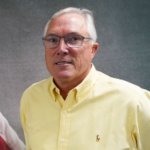
The department has long been troubled by accusations of a lack of transparency, stemming in part from fatal shootings involving Chico police officers, such as the 2017 killings of Tyler Rushing and Desmond Phillips.
PCAB and the police reform challenge
One of the new advisory board members, Julian Zener, has been working with police reform organization Concerned Community for Justice (CC4J). He told ChicoSol that he thinks that Aldridge is open to the state’s push for more progressive policies — such as increasing engagement with the community and following the law to train officers on de-escalation and use of force.
“The teeth probably come not from local activities as much as from the state,” Zener said. “The state has generated an avalanche of new laws over the last few years related to law enforcement. They ban chokeholds, they have restrictions on use of force, decertifying police, upping the age of new hires.”
Those policies take time to implement and start with local leaders, he said.
Zener pointed out that the Advisory Board is not an oversight commission like some cities in California have. Those commissions hold meetings that are generally open to the public and subject to the Brown Act.
“It’s not an oversight committee at all, but it’s certainly better than nothing,” Zener said.
Board member Joseph Person said that people base their perception of Chico police on their experience and what they hear from others, and coming together to make communities safer requires the police do so as well.
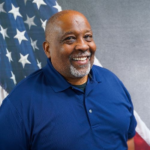
Person is a longtime Chico resident who was raised in the city in the 1960s and returned home from Hawaii in the ’90s. He worked at Butte County Juvenile Hall and his brother worked for Chico PD until several years ago.
“Everyone (on the board) was chosen to represent a segment of the demographics in Chico, like myself representing the African-American community,” Person said. “The committee isn’t necessarily a watchdog over the police; we were formed to help the police get a better handle on how the department is seen and how [Aldridge] can better shape that to serve it in a better way. We’re more of a service dog.”
Person said that the chief seems open to working with Black community leaders such as the local NAACP chapter’s Janet and David Goodson.
“I think the chief is open to dialogue, and he’s asking for input, and I think that goes a long way,” he said.
Calls for reform
CC4J has met with Aldridge many times with a broad list of requests, including that the department increase training in implicit bias and de-escalation. CC4J has recommended overhauling the use-of-force and hiring and termination policies, creating a mental health intervention team, improving mental health support for officers and creating a community oversight board that could improve department accountability.
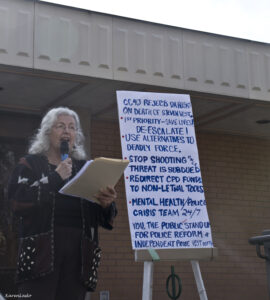
CC4J member and attorney Marty Dunlap told ChicoSol that she has seen some positive change from the police department, and the new Advisory Board is a step above the 2020 ad hoc committee, which she called “very disappointing.” This chief, she says, seems more open to feedback than the previous chiefs Mike O’Brien and Matt Madden.
Dunlap said she’d like to see a program that would divert mental health calls to social workers. She’d like to see a program that would encourage officers to get to know people in various neighborhoods — particularly in historically marginalized communities.
Where to spend tax dollars
Longtime CC4J member Ann Polivka said that many activists would like to see funding diverted from Chico PD to a 24/7 mobile crisis intervention team for mental health calls — which is done, for example, in the city of Oakland.
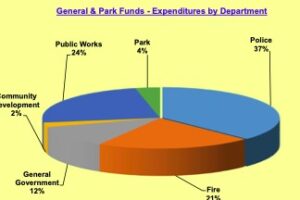
Chico PD’s budget allocation still makes up the largest share of City spending, even though that percentage has been reduced substantially by the influx of new sales tax revenue that has mostly been channeled into road repair. Chico PD officially consumes 37% of the City’s General Fund, although there are some uncounted police-related costs elsewhere in the budget.
“It’s clear that the City Council, financially, gives the police department an open checkbook with their increased salaries, their hiring bonuses, and rubber stamps whatever they want, as far as equipment goes,” Zener said.
In recent past years, Chico PD’s spending on surplus military equipment has been an irksome point for many activists, like Polivka.
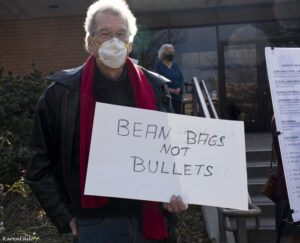
Zener, though, said Aldridge has made some “valid arguments” for purchases of some items. “The chief makes the credible argument that some of this so-called military equipment actually has a defusing capability,” he said.
Zener said that every police car will soon be equipped with an AR-15 semi-automatic rifle, which he called a “devastating weapon,” but indicated he hasn’t opposed their adoption.
Polivka, meanwhile, said she’s requested that both the AR-15s and the Super-Sock Bean Bags be retired from service at Chico PD. Even the Bean Bags can be lethal, she added.
“We don’t think the police should be warriors in our town, which is not a combat zone,” Polivka said, adding that she believes the community should demand more accountability — that is, more specifics — in its military equipment policy and use reports.
Accountability at Chico PD
Polivka is also concerned that the investigations led by District Attorney Mike Ramsey into officer-involved killings aren’t holding police accountable in cases of possible misconduct. “The DA has backed up every single officer-involved shooting and death, saying that it was justified, all within the last 38 years,” she said.
Chico activist Melys Bonifacio has been working with the Justice for Desmond Phillips and other groups demanding police reform for years, and is concerned about national policies that govern local policing.
Bonifacio said that she wants to see qualified immunity abolished on a federal level, which protects officers from being held accountable for crimes they committed. The law should also hold police departments responsible for the handling of evidence in officer-involved killings.
“More people were killed by police in 2023 than in any other year in the past decade,” she noted.
Locally, Bonifacio said that she thinks it will take more than a receptive new chief to lead the department toward real change.

“The city approves police budgets with military equipment but does everything in its power to stop organizations like Safe Space from doing their job,” she said. “I do believe we are seeing more community oversight, but that is not a reflection of the current chief. It’s more so a reflection of the [nationwide] Black Lives Matter protests of 2020. People genuinely questioned why police conduct has been so bad in responding to situations.”
On the local level, Dunlap said much depends on interest in policy on the part of the City’s elected leaders.
“The real change comes from the city councilmembers,” Dunlap said. “It’s the elected people who make the decisions on policing in our community.”
This story was corrected on May 1 in the paragraph about Joseph Person’s background. Person worked at juvenile hall, not at a law firm as first stated.
Natalie Hanson is a contributing editor to ChicoSol. Editor Leslie Layton contributed reporting to this story.
